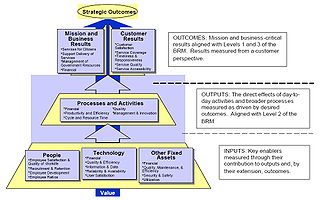Dispersed knowledge in economics is the notion that no single agent has information as to all of the factors which influence prices and production throughout the system. The term has been both expanded upon and popularized by American economist Thomas Sowell.
Strategic planning is an organization's process of defining its strategy or direction, and making decisions on allocating its resources to attain strategic goals.
Middle management is the intermediate management level of a hierarchical organization that is subordinate to the executive management and responsible for ‘team leading’ line managers and/or ‘specialist’ line managers. Middle management is indirectly responsible for junior staff performance and productivity.
Marketing strategy is an organization's promotional efforts to allocate its resources across a wide range of platforms, channels to increase its sales and achieve sustainable competitive advantage within its corresponding market.

Information management (IM) is the appropriate and optimized capture, storage, retrieval, and use of information. It may be personal information management or organizational. IM for organizations concerns a cycle of organizational activity: the acquisition of information from one or more sources, the custodianship and the distribution of that information to those who need it, and its ultimate disposal through archiving or deletion.
Organization studies is the academic field interested in a collective activity, and how it relates to organization, organizing, and management. It is "the examination of how individuals construct organizational structures, processes, and practices and how these, in turn, shape social relations and create institutions that ultimately influence people".

A cognitive map is a type of mental representation which serves an individual to acquire, code, store, recall, and decode information about the relative locations and attributes of phenomena in their everyday or metaphorical spatial environment. The concept was introduced by Edward Tolman in 1948. He tried to explain the behavior of rats that appeared to learn the spatial layout of a maze, and subsequently the concept was applied to other animals, including humans. The term was later generalized by some researchers, especially in the field of operations research, to refer to a kind of semantic network representing an individual's personal knowledge or schemas.

Design management is a field of inquiry that uses design, strategy, project management and supply chain techniques to control a creative process, support a culture of creativity, and build a structure and organization for design. The objective of design management is to develop and maintain an efficient business environment in which an organization can achieve its strategic and mission goals through design. Design management is a comprehensive activity at all levels of business, from the discovery phase to the execution phase. "Simply put, design management is the business side of design. Design management encompasses the ongoing processes, business decisions, and strategies that enable innovation and create effectively-designed products, services, communications, environments, and brands that enhance our quality of life and provide organizational success." The discipline of design management overlaps with marketing management, operations management, and strategic management.

Performance measurement is the process of collecting, analyzing and/or reporting information regarding the performance of an individual, group, organization, system or component.
Stakeholder analysis in conflict resolution, business administration, environmental health sciences decision making, industrial ecology, public administration, and project management is the process of assessing a system and potential changes to it as they relate to relevant and interested parties known as stakeholders. This information is used to assess how the interests of those stakeholders should be addressed in a project plan, policy, program, or other action. Stakeholder analysis is a key part of stakeholder management. A stakeholder analysis of an issue consists of weighing and balancing all of the competing demands on a firm by each of those who have a claim on it, in order to arrive at the firm's obligation in a particular case. A stakeholder analysis does not preclude the interests of the stakeholders overriding the interests of the other stakeholders affected, but it ensures that all affected will be considered.
In organizational theory, dynamic capability is the capability of an organization to purposefully adapt an organization's resource base. The concept was defined by David Teece, Gary Pisano and Amy Shuen, in their 1997 paper Dynamic Capabilities and Strategic Management, as the firm’s ability to engage in adapting, integrating, and reconfiguring internal and external organizational skills, resources, and functional competences to match the requirements of a changing environment.
Technology scouting is an element of technology management in which
Corporate foresight has been conceptualised by strategic foresight practitioners and academics working and/or studying corporations as a set of practices, a set of capabilities and an ability of a firm. It enables firms to detect discontinuous change early, interpret its consequences for the firm, and inform future courses of action to ensure the long-term survival and success of the company.

Alfred Allen Marcus is an American author and the Edson Spencer Professor of Strategy and Technology Leadership at the Carlson School of Management, University of Minnesota and the Technological Leadership Institute. He has worked as a consultant with companies such as 3M, Corning Inc., Xcel Energy, Medtronic, General Mills, and IBM and has also taught as a visiting professor at Technion, INCAE, BI Norwegian Business School, Fordham University, and MIT.
In sociology, intragroup conflict refers to conflict between two or more members of the same group or team. In recent years, intragroup conflict has received a large amount of attention in conflict and group dynamics literature. This increase in interest in studying intragroup conflict may be a natural corollary of the ubiquitous use of work groups and work teams across all levels of organizations, including decision-making task forces, project groups, or production teams. Jehn identified two main types of intragroup conflict: task conflict and relationship conflict.
Strategic control is the process used by organizations to control the formation and execution of strategic plans; it is a specialised form of management control, and differs from other forms of management control in respects of its need to handle uncertainty and ambiguity at various points in the control process.
Behavioral strategy refers to the application of insights from psychology and behavioral economics to the research and practice of strategic management. In one definition of the field, "Behavioral strategy merges cognitive and social psychology with strategic management theory and practice. Behavioral strategy aims to bring realistic assumptions about human cognition, emotions, and social behavior to the strategic management of organizations and, thereby, to enrich strategy theory, empirical research, and real-world practice".

Problem structuring methods (PSMs) are a group of techniques used to model or to map the nature or structure of a situation or state of affairs that some people want to change. PSMs are usually used by a group of people in collaboration to create a consensus about, or at least to facilitate negotiations about, what needs to change. Some widely adopted PSMs include

Yadong Luo is the Emery M. Findley distinguished chair and professor of management at the University of Miami in Coral Gables, Florida.
Shaista E. Khilji is an American academic, researcher, and author. She is a Professor of Human and Organizational Learning & International Affairs at the George Washington University, where from 2018 to 2022 she served as a Faculty Senator, and a member of Faculty Senate Executive Committee. She is the Founding Editor-in-Chief of South Asia Journal of Business Studies.





